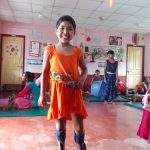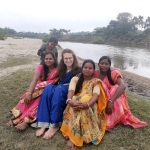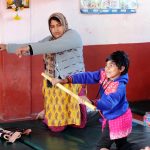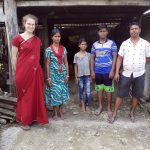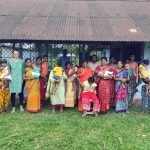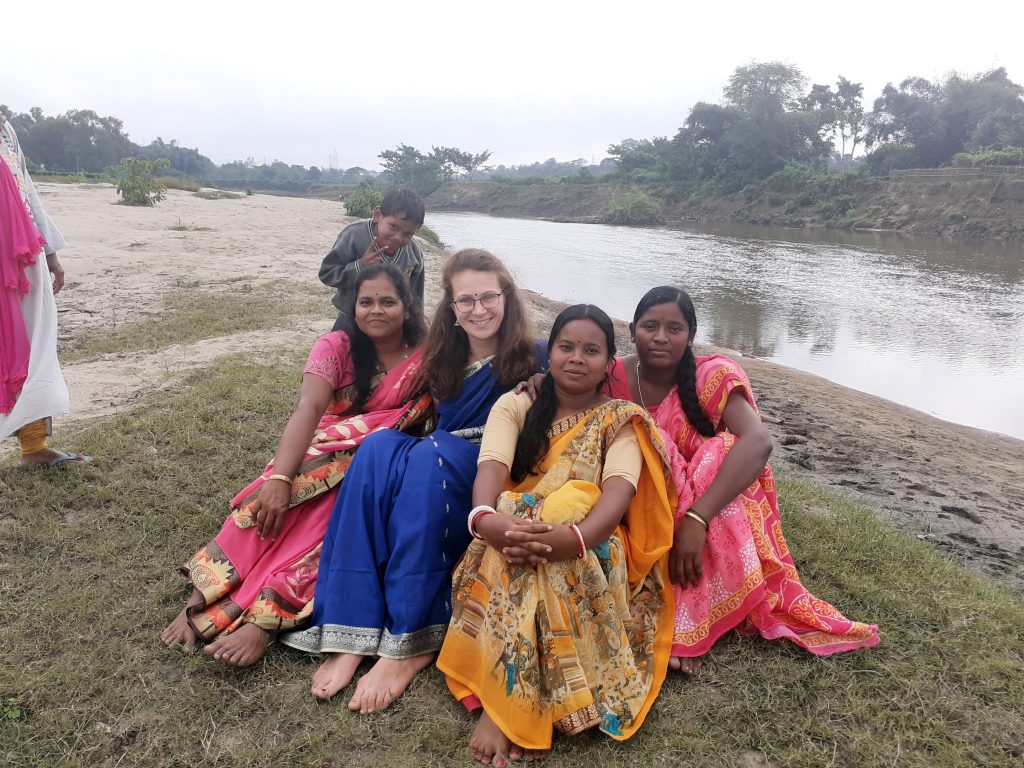
Laurence avec les didi.
Before starting my professional career, I wanted to offer my time and the skills I have been given in the service of others. It was an opportunity to confront my own limits while getting to know myself better and stepping outside of my comfort zone. The Pope told us during World Youth Day in Poland: ‘Get off your sofa and put on some sturdy hiking boots.’ I spent many years in the Girl Guides and in that time developed a taste for adventure. Finding out about another culture and learning how other people live, who share the same planet, is something that is dear to my heart. So after a week’s training, I was sent on a mission to Jalpaiguri, in north-east India.
I spent a year as a volunteer with the Howrah South Point (HSP) NGO. This organisation, which was founded in 1976 by Father Laborde, provides assistance to the most deprived, particularly to children with disabilities, to young mothers living in slums and to children from the poorest families. The organisation has about ten properties in different locations in the state of West Bengal. I lived for a year in Bakuabari near Jalpaiguri, between Nepal, Bhutan and Bangladesh.
Arrival and first impressions
From the very first minute spent in India, I realised that I had landed in a country with a way of life that is completely unknown in Belgium. Living in an age when humanity’s way of life all over the world is becoming standardised, these particularities are the charm of India and give the feeling of living ‘in another world’. One of the first things I noticed in the streets of Kolkata, and even more in rural areas of Jalpaiguri, is people’s gaze. Not just because of my white face and my height – I’m a head taller than most Indians – but particularly because they don’t have their attention focused on their phones as people do in Europe. Indians observe everything that is going on around them and delight in little things. They pay attention to detail and notice things that escape us.
My mission
I was sent as a physiotherapist, but it wasn’t explained to me in any detail what exactly I was supposed to do. After a week, I started wondering how I, a fresh young graduate, was going to be able to make any changes in this centre in the middle of this disorganized country. The thing is, Indians do not use a diary, everything is communicated by telephone on the day itself. In terms of physiotherapy, we had one and a half hour sessions in the morning, all the children would arrive at the same time, each assistant then took a child more or less at random. We had twenty children in the room at the same time with four assistants to look after them. The result was rather chaotic. So I set about reorganizing these sessions (with the few English words that the assistants understood and the few Bengali words that I knew) so that each child was looked after by an assistant. I also took time to create a complete assessment for each child and to prepare an appropriate programme for them so that they could make the best possible progress.
The assistants did not really have any training in physiotherapy. Some had been trained by international organizations as world physiotherapists, but the majority had left the NGO. So I was asked to train new physiotherapists and do a refresher for the few existing ones, then I was asked how much time I needed. I wanted to tell them that I had never trained a team before, but then I replied: ‘a year’, because I was staying there for a year. This was my first mission challenge.
In February, there was a relaxation of Covid-19 restrictions. At the centre, which works at a good standard in physiotherapy, we thought it would be great to welcome children from surrounding areas who needed treatment. At the entrance to Bakuabari, there is an old restaurant that closed down, and the building was unused. Why not turn it into a reception centre for physiotherapy? The following week, we started welcoming outside children every Tuesday and Thursday. So we quickly formed an intercentre physio team and we continued working tirelessly. So far, over seventy children have benefited from physio support. The majority of them present with club feet which have not/no longer been treated during the two years of lockdown. Also there are other congenital deformities, cerebral palsy in various forms (hemiplegia, diplegia, quadriplegia, etc. ), intellectual developmental disorder, etc. HSP helps them financially because, for some of them, a EUR12 plaster cast is equivalent to several months of savings. We also recommend exercises for parents to do with the children at home.
The words of one of the assistants really touched me, during morning physio ‘Sister, I really like physio. We can help children progress. Plus, we’re having a great time together. Practising physiotherapy in the morning puts me in a good mood, it gives me momentum for the rest of my day.’ Coming from a person who never chose to be a physiotherapist, it made my heart feel better, my mission was successful. They understood the true meaning of physiotherapy.
Alongside my physio work, I took part in centre activities and in providing education for girls, through educational activities and English courses. It’s such a delight to help all these children grow! They are like little stars that, each day, shine a bit brighter.
Special events
Every day in India is exceptional: in the morning you have no idea what will happen during the day. The Indian world is very last-minute. This simple life with these children who trust us makes me understand that it doesn’t take much to be happy. For HSP, ‘every human being is a star that deserves an opportunity to shine’. These children, who may not have been born under the best auspices, will have the opportunity to receive care, food and schooling.
I spent a year that was full of adventures and wonderful moments. Here are three of them.
The first memorable moment was the Annual HSP Jalpaiguri Sports Day. Everything happened like it was the opening ceremony of the Olympic Games: three children carry the Olympic flame and go around the field, followed by a few girls dancing. Then there were the games, adapted as necessary. We had a running race, a potato-spoon race, an assistant backward running race, a blindfold race, a ball and bottle race, etc. The morning ended with dancing and a magnificent concert hosted by our brother, Emmanuel, an MEP volunteer. In the afternoon, sports games resumed. At the end of each event, the first three were rewarded. Trophies were not chosen randomly. The traditional gold, silver and bronze medals that end up in our cupboards were replaced by a large plate for the first prize, a smaller one for the second prize and a cup for the third prize. Runners-up were given a bati (a bowl for dhal soup because many children do not have one). For other events, first prize is a large bucket for washing and doing laundry (most people wash themselves using an old paint can), second prize is a small bucket, and third prize is a bowl to take water. The smiles of the children who proudly display a bucket, plate or a bowl is worth any number ofgold medals.
Another significant event was my time in the Tea Garden. On August 6, 2022, I woke up as usual at 6:30 a.m., then hesitated between remaining in a kurta or putting on a sari. This will have consequences for the future. I opt for the sari and we start around 8:30 a.m. We’re off on an adventure. A morning to travel 50 km through the jungle using different modes of transport: car, tuk-tuk, bus, convoy. We finally arrived at Bagrakot Tea Garden, where we will meet the father of Sadana and Sandip, two children from the HSP centres, who will be our personal driver for the whole expedition. We make an attempt to visit the Tea Factory, but they take me for a tourist and unfortunately I’m not allowed in. I have to show my credentials. Daliyadi, an assistant from my centre, rings a doctor in Kolkata who takes the call after having also spoken to me on the phone, and who gives me an appointment at 4:30 p.m. in front of the factory. In the meantime, we visit various families of children who have been entrusted to HSP; that of Sadana and Sandip, where I test the resilience of my stomach with the local water (I’m fine afterwards, no stomach ache).
Next I head to the house of Ashadi, an educator at my centre, where I eat a feast of fish and vegetables. After the meal, we go to Janbi’s house, which is incredibly peaceful. Also, all the neighbours’ children come here to play. We end with the house of Ankita who has a one and a half month old baby. When the time arrives for our meeting at the Tea Factory, this time, the red carpet is rolled out for me, the manager welcomes us and gives me a private tour of the factory in English. We end with a tasting of duth cha (milk tea) adjusted to our tastes, amazingly good! After a good discussion, we head towards the exit to return to Bakuabari, but then there is an absolute deluge and night is falling. It is impossible to return safely because we have to go through the jungle, and we might come across an elephant or a tiger in this region. We decide to spend the night there. I realize that spending the night in a sari is likely to be quite uncomfortable. But this is to underestimate the incredible Indian hospitality. They bring me newclothing, a toothbrush, etc. I am pampered like a queen. In the evening, I am served paneer (between tofu and cheese), it’s a festive meal. In addition, I have a bed to myself, whereas they live, all seven of them, in a house as big as a garden shed, and have only three beds. In the morning, I am served lucis (fried chapattis), then we leave for Bakuabari. In the Tea Gardens, there is running water for just half an hour in the morning and in the evening. Everyone stands ready to fill cans, dishes and containers in the house. It makes you think, when we only have to turn on a tap to get hot and cold water. And a small detail in passing: to go to the toilet, you have to pass through the cowshed. During the day, when it is light, everything is fine, but at night, without any lighting, it is a bit of an adventure. Even so, I remember this magnificent example of Indian hospitality and sense of welcome in this family of Tea Workers.
Finally, the culmination of my mission: physiotherapy. Children who have started or resumed walking (after Covid). The Biblical verse ‘Arise and walk’ really makes sense to me. What joy, for them of course but also for me, to see them take their first steps unaided! I am also thinking of the congenital deformities that we were able to straighten out with operations, plaster casts and physiotherapy. A 14-year-old boy with fairly pronounced club feet told me after his operation: ‘Sister, I’m going to be able to play football again like other children, that’s great!’
Personal growth
This adventure will mark me for life. Using your talents to help others and to be attentive to the needs of others is part of Christ’s teaching. I spent a lot of time with educators who gave of themselves unstintingly, without counting the cost. Some are there 24 hours a day. I tried to understand what were the special talents of each one, and to highlight these talents in the service of the children. A smile gives energy and, what is even more important, it goes beyond borders. Everything is easier when you do it with a smile, when you understand and love what you are doing. One morning, I was talking with the assistants about what motivates us in the morning and one of them said: ‘Breakfast’, another: ‘Tea’ and one said to me: ‘A smile and seeing you smile, sister!’
I learned to develop patience, to enjoy the present moment and not always be thinking about what will happen next. In Europe, we always think about what will happen next – the simple life and the Indian mindset of doing things at the last minute taught me to be fully in the present moment. Take full advantage of the present moment and do not always think about what happens next, because that takes away part of the delight.
‘Even though time is passing, I still remember my first Girl Guide camp, and the day of my promise, a beautiful summer morning. I often think about it and I remain faithful to it. Happy memory, stay with me, accompany me always!’ These words of the song: ‘Accompany me always’ often come back to me and remind me of the summer of 2012 at Molino de Calcina where I answered the question ‘How long are you ready to serve?’ : ‘If it pleases God, always.’ These words supported me in living each day of my mission in India. Ten years ago, I had prepared this promise by choosing to go deeper into the scouting law ‘A guide serves and saves her neighbour’. I experienced this very concretely. My training as a physiotherapist allowed me to serve these children with disabilities and I tried to create a better future for each child. The HSP NGO helped to save them. If they had not been taken care of, their very poor families would not have had the means to care for them and, on occasion, even to feed them. Here, they are cared for, fed and have an education adapted to their personal situation.
For my part, I would like to conclude with a quote from Mother Teresa: ‘Life is a challenge to be met, a happiness to be deserved, an adventure to enjoy.’ This year of mission was, for me, an immersion in an unknown land that was filled with adventure, selfless giving and shared joy.
Laurence Coppieters, MEP volunteer
- L’atelier de physiothérapie.
- Laurence avec les didi.
- L’atelier de physiothérapie.
- En sari lors de la sortie au Teagarden.
- Le centre de physiothérapie outdoor.
